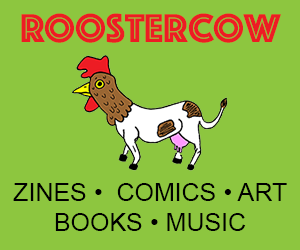Assorted zines about food and drink reviewed by Chris Auman
Under the Radar: Notes from the Wild Mushroom Trade
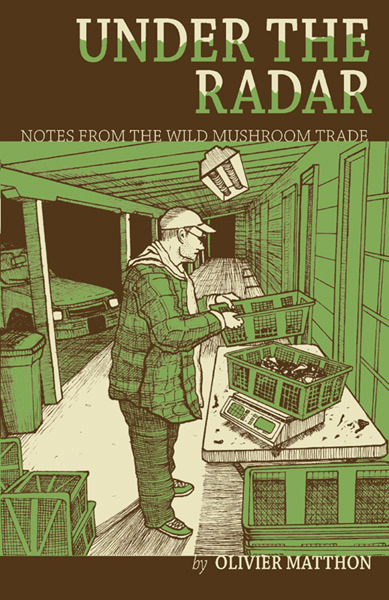
By Olivier Matthon [Pioneers Press]
Now here’s an occupation I’ve given zero thought to previously: Mushroom Picker. I think I would prefer the job title of Fungus Finder or maybe Shroom Wrangler, personally. The point is this: someone is out there picking those wild mushrooms.
I went morel hunting once as a kid, out there in the sticks of rural NW Illinois where I grew up. We started in the very early morning, but not too early for my much older cousin, Dickie, to crack a beer. It was fairly exciting, kinda like Easter egg hunting but harder. And nothing tastes like a breaded and fried morel. Even though they look pretty gnarly, you never forget the taste. That was a purely recreational pursuit, however, and many Mushroom Pickers rely on the picking season to support themselves year-round.
Under the Radar was written by picker Olivier Matthon and it chronicles his time perusing the forests of the Pacific Northwest in search of edible shrooms and a hard-earned buck. (These aren’t psychedelic mushrooms, btw, but the kind chefs and restaurateurs will pay good coin for). Olivier has held a variety of jobs on the outer edges of the workforce and mushroom picker is right at home on his resume with his other occupations as cherry picker, tree planter, clam digger, and firewood hawker.
Under the Radar alludes both to the hunted fungi that lay half hidden in the undergrowth, but it also refers to the fringe-dwelling hunter. Mushroom Pickers exist off the grid and that makes them outsiders and a part of an underground economy and society of nomads. In addition to the sketchy financial rewards of pickers, there are dangers as well. Sometimes I suppose you might find yourself on the wrong side of a fence, and don’t forget the marijuana growers. Where there’s drugs, there’s money and thugs with guns to protect them both. Also, as with many industries, there is an immigrant class who will pick for cheaper and who lack the experience and the reserve to leave the younger mushrooms alone until they can grow into a more valuable future crop.
All in all it’s a hard way to make a buck, but it seems to be about more than money for the pickers. You don’t become a mushroom picker to get rich. It’s more likely you’re already living off the land and by your wits, and this kind of work suits the type of person who doesn’t want to be tied down to one job or one place, for whatever reason. This makes Under the Radar a very engaging read if you’re into subcultures as zine writers and readers often are.
Two Vegan Cookbooks
Not sure if you are an omnivore, herbivore or carnivore? If you follow a vegan diet, then you are an herbivore and Microcosm Publishing has cookbooks for you. Many in fact, but two of their latest titles come from the cheffing and illustrating duo of Automne Zingg and Joshua Ploeg.
Comfort Eating with Nick Cave & Defensive Eating with Morrissey
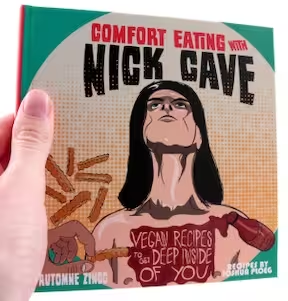
According to her website, Zingg is a writer, illustrator, musician, and visual artist based in New York. She does appear to be a motivated and creatively active woman who would no doubt give some credit for her productivity to a vegan diet. This by no means suggests that she is not susceptible to the occasional bouts of being bummed out. As she explains in the introduction to these cookbooks, she experienced a pretty deep period of depression following a breakup in 2013. She wasn’t eating or working but she was putting a soundtrack to her funk in the form of the depressing songs she listened to as teenage goth. She describes this music as ‘sonic soul food’ and it helped her during these dark times.
Drawing helped too and creating doodles of her favorite musicians eating food gave her comfort. She gave these drawings to friends who then demanded more. This led to a zine filled with images of Morrissey eating various food items. That’s what you’ll find illustrating the pages of these two cookbooks with Morrissey stuffing his face in Defensive Eating and Nick Cave doing likewise in the Comfort Eating edition. And if that wasn’t enough quality entertainment, for added value vegan chef Joshua Ploeg has created dozens of delicious recipes to inspire you to get cooking.
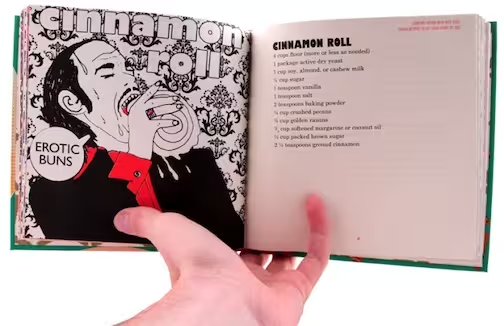
Pun-y recipe titles include “Boy with the Corn in His Side,” “Peas Let Me Get What I Want” (Morrissey), and “The Face of Jesus in My Soup” (Cave). Of course, a good cookbook would never require you to be a fan of a particular band or musical style. You must only love cooking and food.
Being vegan is not about denying yourself flavor, so if you are vegan, you will find plenty of healthy and flavorful recipes that are both easy to make and cheap to boot. The recipes themselves are the creation of punk rock vegan chef Joshua Ploeg. Ploeg is a touring chef and a personal chef in Los Angeles and, in his words, is a noisy punk rock “singer”. I have reviewed a few of Ploeg’s recipe collections in the past. You will find those reviews here and here.
Note: If you do make any of the dishes outlined in these books, remember to use those leftovers and reduce the amount of food waste you feed to landfills!
More Zines About Food and Drink
Edible Secrets: A Food Tour of Classified US History
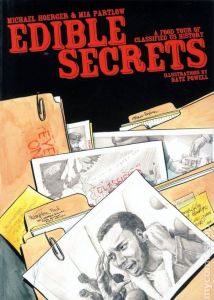
Mia Partlow & Michael Hoerger
How do you take the information obtained from over a half million declassified government documents and present it in a way that is palatable for the average reader? You do what Mia Partlow and Michael Hoerger did. You make it about food.
The pair noticed a theme while scouring through these piles of files: references to food kept popping up like waffles out of a toaster. That became the focal point of their presentation, from the CIA’s attempt to poison Fidel Castro’s milkshake (one of many failed assassination attempts) to the trumped-up ice cream truck robbery charges that resulted in jail time for a young Fred Hampton. The book also sheds light on the bubbly relationship between the Coke and Pepsi corporations and whoever happens to be in the White House. (The Cola Wars is serious, ya’ll.)
Edible Secrets also examines the CIA’s study of subliminal messaging, which was originally used to subconsciously compel moviegoers to crave popcorn. And what was Ronald Reagan’s solution to Mexico’s impending food shortage? Why the answer to all the world’s problems of course: The Free Market. Quite a compelling effort here and one that will make you hungry for more knowledge about what our government is cooking up in their behind-the-test kitchens. (NOTE: All puns intended.)
This Ain’t No Picnic: Your Punk Rock Vegan Cookbook
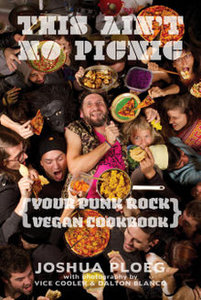
By Joshua Ploeg [Microcosm Publishing]
Published by Microcosm Publishing, purveyor of DIY publications from health guides to left-leaning political zines, This Ain’t No Picnic is “Your Punk Rock Vegan Cookbook.” With pierced tongue in cheek, this awesome-looking recipe compendium is presented in a humorous, self-effacing style that pokes fun at all things punk while simultaneously teaching you how to cook vegan. It’s not about dogma or even dog collars, it’s about making delicious vegan food on the cheap with limited access to things like stoves, ovens, freezers, fridges and other appliances generally associated with cooking.
The book features 80 new vegan recipes from the Punk Rock Vegan Chef, Joshua Ploeg, and is broken down into eight sections that are accompanied by short introductions from various punk rockers, as well as recommended song lists of punk classics. Ploeg is a traveling vegan chef who has cooked for a long list of musicians and bands over his career on the fringes of the culinary world. He also has a lifelong connection to punk rock. He has authored dozens of zines and DIY cookbooks and has, in his words, lived in squalor for the past fifteen years. Photographers, Vice Cooler and Dalton Blanco provide great full-color photos and, despite the intentionally chaotic and cluttered layout of the book, it looks exciting, fresh as a raw rutabaga, and easy to use.
This book contains recipes for dishes that can be made in the tour van, like “Dashboard Jerky” for example, where marinated strips of beets, carrots, and tofu or tempeh can be placed on a piece of foil so they can dehydrate on the hot dash. Or s’mores that can be roasted over the flame of a cigarette lighter. There are recipes for food “fished” from the dumpster, and tips on how to slice and dice vegetables with nothing more than a credit card a la the Credit Card Sandwich tutorial.
While it may increase your enjoyment of the book if you are familiar with the bands and songs that have inspired some of these recipes, and it may be helpful to be a vegan, neither is a prerequisite. Yes, you don’t have to live in a communal punk rock house to cook like a crusty vegan. You don’t even have to listen to punk rock to make these dishes, (you should though), but it may just inspire you to dig into the vast annals of punk rock’s past and explore the health benefits and cruelty-free aspects of a vegan diet.
So Raw It’s Downright Filthy: A Raw Vegan Cookbook
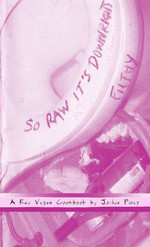
Joshua Ploeg [Microcosm Publishing]
The last raw thing I ate was a raw radish, which was radically delicious, but other than that, I am not a vegan or a vegetarian and I am definitely not a rawcist. Therefore, there’s a good chance that I will not be using any of the recipes in this zine cookbook. I like Joshua’s attitude though. Despite being a vegan/veg chef himself, he still likes to rib militant dieters, as he does in a short excerpt reprinted from his zine, A Chef’s Tale: Strange Travelers Tales of Food, Sex, Random Occurrences & Other Culinary Disasters. If you’re a hard-liner, it doesn’t matter whether your hard line is politics, religion or vegetables, lighten up already! Whatever your diet dictates, many of the recipes in this zine sound pretty dang tasty: Curry Banana, Avocado Mousse and Plum Salad, etc. I do not agree, however, with the decision to include random black and white (black and pink actually) photos of things that are filthy, like the toilet on the cover. This is perhaps to tie in with the zine’s title. Ok, I get it, but it’s still kinda gross.
Hot Damn and Hell Yeah: Recipes for Hungry Banditos: Vegan Tex-Mex & Southern Eats
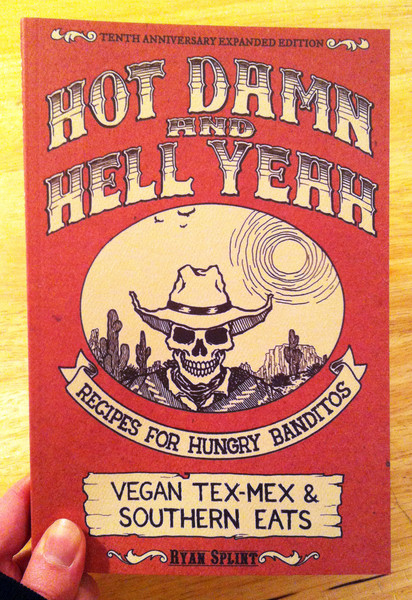
By Ryan Splints [Microcosm Publishing]
When Ryan Splint moved to the Land Down Under (or as they call it in the American South, the Land Down Yonder), he soon found himself missing the Tex-Mex cuisine of his youth. His Aussie friends encouraged him to write a cookbook chock full of vegan versions of these Southern staples. And so he did.
Hot Damn and Hell Yeah is the 10th anniversary expanded edition of that effort. It contains all sorts of delicious recipes made 100% free of animal products. From “corndawgs” to “chili con non-carne,” ya’ll vegan doggies can cook up these vittles yourselves on prairies, patches, vegetable ranches, or around any campfire you find yourself in front of.
The recipes are purposefully straightforward and easy to concoct. While a vegan diet is certainly healthy (if done correctly), this book does not aspire to be a healthy cookbook per se. The focus is on taste first and foremost. These recipes sure do look pretty gol’dang good and the ingredients should be easy to rustle up at your local, healthy, more whole foodier stores.
Brew it Yourself: Professional Craft Blueprints for Home Brewing
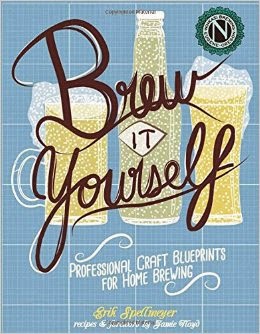
By Erik Spellmeyer [Microcosm Publishing]
Home brewing has come a long way since the mid ’90s when a roommate of mine brought home some ridiculous contraption called Mr. Beer. While Mr. Beer did allow you to brew your own suds back in the day, it sure produced an awful tasting end product. At least that was my experience. Not to be outdone, another roommate during this period also tried his hand at home brewing. Instead of some preformed plastic gizmo, he kicked it a little more old school with stainless steel pots, big thermometers, giant wooden stirring spoons and whatnot. His output tasted like crap too. Were either of these gents to read my description of their beer-making efforts here today, they would undoubtedly, wholeheartedly defend their product and defy that it tasted anything but delicious. My taste buds don’t lie, however.
At any rate, we’ve come a long way from the skunky flavor, moldy basement aroma and horrendous aftertaste of Mr. Beer and his ilk, and Mr. and Ms. Beer Drinker appreciate that. It’s too bad this book, Brew it Yourself, wasn’t lying around the apartment back then because that certainly would have helped the situation.
Brew it Yourself is a do-it-yourself guide that comes correct with info and how-to’s on the how to of extract brewing, all grain brewing and the importance of sanitation to the fermenting process. Written by beer crafter and suds enthusiast Erik Spellmeyer, this is an informative guide that will allow anyone with a little time, a little money and a passion for great hops to brew their own. You can make it as easy or as involved as you like. There are recipes for pales, ales and extra special bitter beers as well as a glossary, conversion guide and a brew log to chart your progress, or lack thereof.
I must confess that I do not plan on brewing my own beer, ever. I prefer getting beer the old fashioned way, from the beer store. However, I am definitely going to pass this book on to former Roommate #1 who has since returned to home brewing, this time employing a much more efficient system, and is no doubt brewing delicious malts and IPAs while the former Mr. Beer more than likely lies at the bottom of a deep landfill somewhere.
Barefoot and in the Kitchen: Vegan Recipes for You
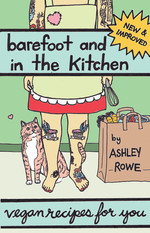
Ashley Rowe [Microcosm Publishing]
Instructive, informative, educative and other words that mean infotational, Ashley Rowe has given us an easy-to-follow cookbook that seeks to demystify veganism and make it more palatable to the public. Mission accomplished. Rowe’s Barefoot and in the Kitchen cookbook lays forth recipes for the creation of delicious, animal-free entrées, salads, salsas and desserts. Also included are cooking tips, an ingredients primer, a handy glossary of cooking terms and comic illustrations.
NOTE: For safety reasons, Reglar Wiglar Magazine can not and does not condone cooking without proper protective footwear, however, we can endorse the recipes in this cookbook.
Home Sweet Homegrown: How to Grow, Make, And Store Food, No Matter Where You Live
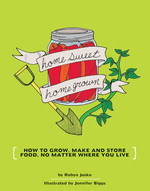
Robyn Jasko [Microcosm Publishing]
The subtitle of this book sums up the content quite concisely: “How to Grow, Make and Store Food, No Matter Where You Live”. What can I add except to say that it delivers on this stated purpose. And not only that, it does so in a well-organized and easy to read fashion. Ok, I haven’t put it to practical application yet, but I certainly could. Starting with seeds and seedlings through to planting, harvesting and using and preserving the fruits of your labor, Robyn Jasko schools the aspiring green-thumb on the how-to. She even gives us the why-for (page 9). There’s instruction on how to make rain barrels, non-toxic bug sprays and baba ganouj and, as a bonus, the book looks great and is lovingly illustrated by fellow Pennsylvanian, Jenn Briggs. Whether you’re growing on a window sill in the city or a wild garden plot in the country you now have no excuse to get planting. [homesweethomegrown.com]
Everyday Cheesemaking: How to Succeed Making Dairy and Nut Cheese at Home
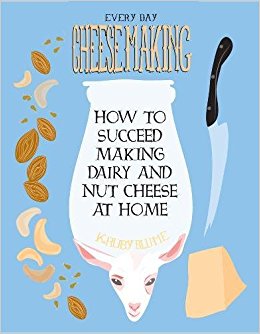
K. Ruby Blume [Microcosm Publishing]
Whenever I read a book or a zine, I learn something—not necessarily a life-altering philosophical truth, but facts, knowledge, information. Like, for example, I did not know that you could make milk and cheese from nuts. I’ve heard of almond milk, of course, but I’ve never given it much thought and I did not know that you could make milk and cheese from other nuts as well. Now I know this and a whole lot more about raw and pasteurized milk, animal husbandry, ethical dairy and how to make your own cheese everyday and, it’s all thanks to K. Ruby Blume and her book, Everyday Cheesemaking.
K. Ruby Blume spent years as an political activist. She hit the streets with signs and puppets aloft and protested nukes, war and income disparity. There came a point, however, when she started questioning the effectiveness of her actions. She wondered just what she was accomplishing with her signs and street theater antics. Blume decided instead to use her considerable skills and talents to teach, empower and encourage people to take back a little more control of their lives by becoming more self-sufficient. In this seemingly small way, big changes can be the result.
Blume teaches cheesemaking, among other things, at the Institute for Urban Homesteading, which she founded in 2008. The purpose of the Institute is to teach people how to live meaningful and sustainable lives in urban settings, which in her case is the Bay Area of Oakland and Berkeley. Her work there has borne the fruit that is this guide.
Blume’s comprehensive, step-by-step instructions can help anyone make cheese. The process is not as complicated as you might think but it does require the use of specific tools and ingredients, all of which are outlined in the guide.
The book begins with some schooling on the history of milk production, the original reasons behind pasteurization, the benefits of consuming raw milk, the harmful effects of factory farming and the ethics of animal husbandry in the more traditional sense where a symbiotic relationship is created between human and beast. Cheesemaking 101 begins the discourse on the creation of a variety of different dairy cheeses. Vegan? That’s fine, no worries there, the last section of the book deals with making cheese with nut and seeds.
So I learned a few things by reading this guide to making cheese at home, but will I actually make cheese at home? I may, I may not. I very likely will not. You may or may not give it a go yourself, but this is a good book to have should the need for homemade cheese inspire you to break out the cheesecloth and curd knife.
Thank you for reading these zines about food and drink. Read more zine reviews here.

